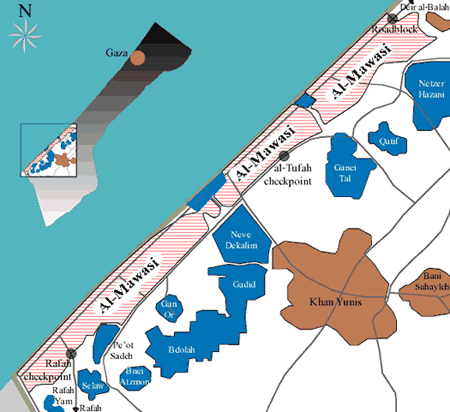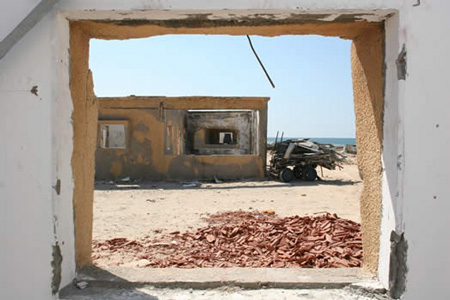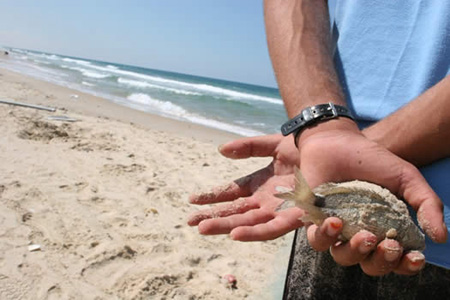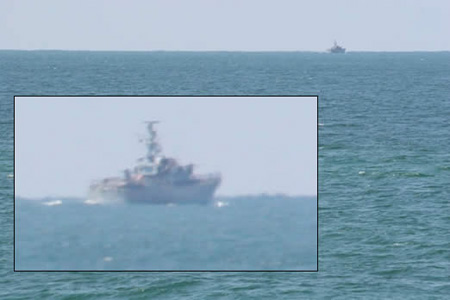DominionSections
Browse Articles
- IndependentMedia.ca
- MostlyWater.org
- Seven Oaks
- BASICS Newsletter
- Siafu
- Briarpatch Magazine
- The Leveller
- Groundwire
- Redwire Magazine
- Canadian Dimension
- CKDU News Collective
- Common Ground
- Shunpiking Magazine
- The Real News
- Our Times
- À babord !
- Blackfly Magazine
- Guerilla News Network
- The Other Side
- The Sunday Independent
- Vive le Canada
- Elements
- ACTivist Magazine
- The Tyee
- TML Daily
- New Socialist
- Relay (Socialist Project)
- Socialist Worker
- Socialist Action
- Rabble.ca
- Straight Goods
- Alternatives Journal
- This Magazine
- Dialogue Magazine
- Orato
- Rebel Youth
- NB Media Co-op
Radio
'Disengagement' Affords Some Relief for Gaza Fishing Enclave
October 20, 2005
'Disengagement' Affords Some Relief for Gaza Fishing Enclave
Coastal villages no longer a veritable prison, but access to fishing, export remain blocked
[This article was originally published by New Standard News, a daily source of original journalism. Non-corporate journalism depends on reader support; please consider contributing to New Standard News to ensure more independent coverage from the Middle East and elsewhere.]
AL-MAWASI, PALESTINE -- Few Gaza communities stand to benefit more from Prime Minister Ariel Sharon's August "disengagement" than the coastal area of Al-Mawasi. Abutting the Gush Katif settlements, Al-Mawasi, a 14 kilometer strip of land just one kilometer wide, had been a veritable prison for years.
The enclave's 5,000 residents were wedged between the settlement and the sea, cut off from the rest of Gaza. Restrictions were so harsh that the Israeli human rights group B'Tselem characterized them as "incarceration… strangulation… and collective punishment."
For the past five years, people could only access Al-Mawasi through a single checkpoint, and it was virtually impossible for non-residents to enter the area – be they family, friends or merchants.
"Life here was impossible," Ismail Abu Zahr told The NewStandard while standing on the Al-Mawasi beach.
"Free movement" – as the Israeli army called the lowest level of access restriction – was enforced by an unseen soldier on a loudspeaker and a magnetic ID-card system, and was restricted to women, men over 40 and children under 12. Residents, however, say this eased level of restriction was almost never in place, and traffic through the checkpoint by anyone was essentially non-existent.

Al-Mawasi's residents are primarily fishermen, farmers and their families, the land being some of Gaza's most fertile. Israel's harsh closure regime left Al-Mawasi's fishermen without access to the sea, and farmers without a market for their goods.
Back-to-back Shipping
Goods entering Al-Mawasi were subject to a "back-to-back" system, whereby trucks offloaded their produce or merchandise at the checkpoint and reloaded them into another truck on the other side.
This form of transport, which is still the system in place between the Gaza Strip and Israel, is enormously costly and time-consuming, resulting in spoiled produce and inflated prices for merchandise.
According to a report by B'Tselem, the Israeli government successfully cut movement of goods to and from Al-Mawasi by 90 percent from pre-intifada levels, with closures beginning after the September 2000 uprising.
The back-to-back transportation system and suffocating restrictions crippled the enclave's economy. Farmers and fishermen who depend on the export of their goods for survival were forced to seek employment as day laborers in Gaza's Jewish settlements. "We were left with no other options," Ismail Abu Zahr said, casting his fishing line into the sea for the first time in years.
But even the pool of Palestinians able to find labor in Jewish settlements was limited, falling from more than 1,000 workers in 2000 to less than 150 by 2005 as Israeli security concerns increased and even cheaper, primarily Asian and Eastern European, migrant laborers filled the positions.
The houses of Al-Mawasi stood in stark contrast to the villas of the Gush Katif settlement. Dilapidated shanties made of sheet metal and discarded building supplies are only meters away from the remains of what were once the lavish seaside homes of Jewish settlers.
Former Palestinain summer home occupied by settlers and destroyed upon their departure.

A row of a dozen homes on the beachfront in Al-Mawasi -- originally summer homes for Palestinians --were taken over and occupied by settlers from Gush Katif. When the settlers and the IDF quit Gaza this year,the militaryeffectively destroyedthe structures alongwith the settler's villas in Gush Katif. © Jon Elmer 2005
Living in conditions of crushing poverty, less than 15 percent of Al-Mawasi residents were connected to the electricity grid; the rest relied on two generators that operated only in the evenings. With tight army checkpoints, residents had sporadic and unpredictable access to fuel, dictated by the apparent whims of Israeli authorities.
Withdrawal from Gaza
The departure of the settlers offers modest relief for the population of Gaza, but the optimism here is still very guarded.
"To make this pullout a positive development," said Dr. Mustafa Barghouthi, General Secretary of the Palestinian National Initiative, a political reform organization, "Palestinians must have freedom of movement, the freedom to import and export goods, control of air and sea, and free passage between Gaza and the West Bank."
It is the continued military control that Israel exerts over Gaza that worries Barghouthi, who finished as runner-up in the most recent Palestinian presidential election.
Indeed, Israeli F-16s continue to roar overhead daily, the coastline is spotted with Israeli warships patrolling Gaza's waters, and the borders with Israel and Gaza are effectively sealed.
"Israel must give up Gaza completely and stop interfering in the daily life and affairs of Palestinians," Barghouthi told The NewStandard, noting his concern that the back-to-back shipping regime and lack of an economic link even to the West Bank – let alone the rest of the world – would stifle Gaza's economy.

An Al-Mawasi fisherman holding his day's catch along the Gaza coastline. Al-Fishermen here are delighted by the recent evacuation of the settlers and soldiers from the area, but are still unable to access the sea because of a de facto prohibition by Israeli warships patrolling the coast. © Jon Elmer 2005
"This is very important," he said. "Gaza is a very small area: only 1 percent of the land of historic Palestine, and less than 6 percent of the occupied territories. Alone, it is not viable economically: it has 1.4 million people in an area that is 366 square kilometers… and Israel remains in control of its land, air and sea."
The World Bank cites similar concerns. In a comprehensive June 2004 report commissioned by both the Israeli government and the Palestinian National Authority, the World Bank warned that unless Israel's restrictions on the freedom of movement and goods are overhauled the disengagement will have "very little impact" on Gaza's economy and "would create worse hardship than is seen today."
The World Bank points to Israel's closure regime as, "above all," the source of the Palestinian economic recession, which it characterized as "among the worst in modern history," exceeding the scale of losses experienced during America's Great Depression and the Argentine collapse of 2001-2002.
Still, Much Work to be Done
Despite the hardships, there is a tangible sense of relief among Al-Mawasi residents with the departure of the Gaza settlements, army sniper towers and internal checkpoints.
"There was a huge celebration here," Ali Maharbe told TNS on the Al-Mawasi shoreline. "And the sheer joy of finally going to the sea again," he said, smiling.
"When the settlers were here, I was prevented from fishing," Maharbe continued. "The situation is a lot better but we are still forbidden from using our boats, so the fishing is tough," he added, digging into his sand-covered cache to show off the day's modest catch gained by casting his line into the ocean from the beach.
Many of Al-Mawasi's fishermen described the same prohibitions. When TNS visited the enclave, there was not a single Palestinian boat at sea, but scores of fisherman were casting their lines and plying their trade with improvised nets from the beach.
The IDF denies that there are still formal restrictions on Palestinian boats in the sea off Al-Mawasi, but it is apparent that the unofficial rules are well-understood by Palestinians, who say it is not uncommon for the Israeli warships to shoot at the fishermen and their boats, even on the shore.

An Israeli warship patrols the sea off the Al-Mawasi coast. Local fishermen say that while official restrictions against them taking their boats offshore have been lifted, they still risk having Israeli gunboats fire upon them. © Jon Elmer 2005
Israeli warships and patrol boats are clearly visible, as are Israeli trawlers. Fishing well within the coastal waters of the Gaza Strip, the Israeli fishing boats are "guarded" by the naval vessels. "That is part of the operational duties of the Navy," the IDF media office told TNS.
Still, for the first time in years the beach is full of Al-Mawasi's fishermen visibly enjoying their new freedom, however limited.
© 2005 The NewStandard.
Related articles:
By the same author:
Archived Site
The Dominion is a monthly paper published by an incipient network of independent journalists in Canada. It aims to provide accurate, critical coverage that is accountable to its readers and the subjects it tackles. Taking its name from Canada's official status as both a colony and a colonial force, the Dominion examines politics, culture and daily life with a view to understanding the exercise of power.